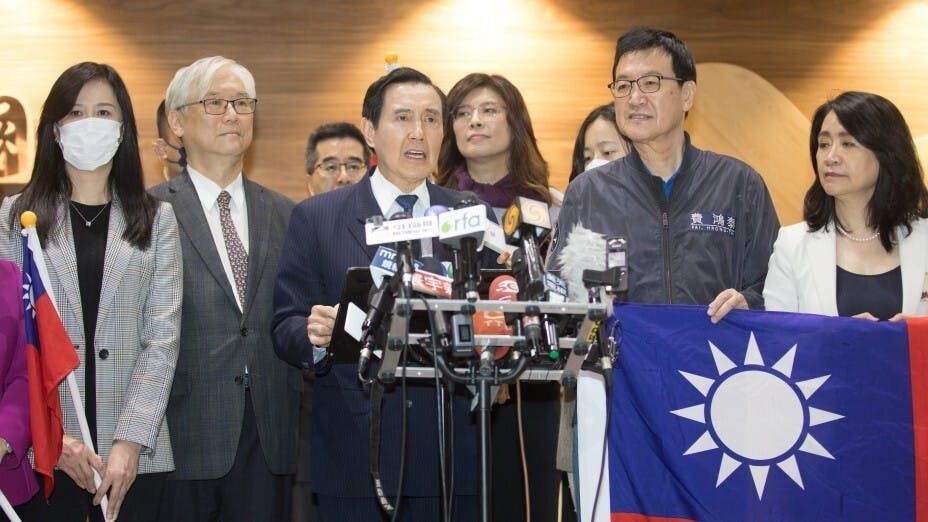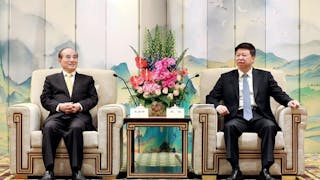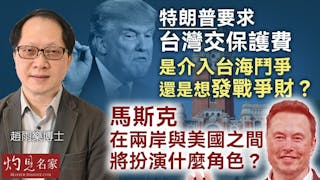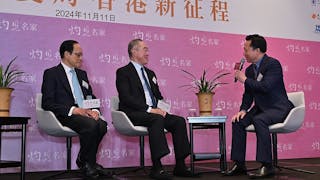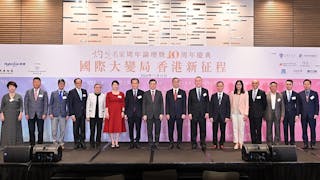國民黨前主席馬英九對中國大陸為期 12 天的訪問,不僅對台灣島內的政治發展,而且對未來幾年兩岸關係都具有重大的政治影響。
馬英九此行經過精心安排,他訪問了南京、武漢、湖南、長沙、重慶和上海──每個地方都有其政治象徵意義和特殊意義。在南京,馬英九參觀了紀念侵華日軍南京大屠殺遇難同胞紀念館,更重要的是,他參觀了南京中山陵。 在馬英九參觀中山陵期間,他使用「中華民國」一詞來提及孫中山對1911年辛亥革命的貢獻──這個詞嵌入了「九二共識」的信息中,國民黨和中國共產黨均同意只有一個中國,但一個中國的含義取決於國共雙方各自的解釋。
馬英九說,孫中山反對分裂,兩岸人民都應該共同努力,追求和平、避免戰爭,致力振興中華。 馬英九使用的「振興中華」,與中國共產黨使用的「中華民族偉大復興」產生了共鳴──這是另一種政治象徵意義,意味着大陸和台灣在未來幾十年實際上有實現和平和振興中華(或復興中華民族)的共同目標。
台接受「九二共識」 陸放棄武力應對?
從政治象徵意義來看,馬英九能夠使用「中華民國」一詞,是對台灣執政民進黨主張兩岸互不隸屬的有力反駁。 問題的癥結在於,民進黨拒絕接受「九二共識」──其明顯的意思是堅持「一個中國」原則,其潛在的意義是擱置「一個中國」政治含義的分歧。
2月25日,國台辦發言人朱鳳蓮表示,「九二共識」體現了「一個中國」原則,明確界定了兩岸關係的性質,奠定了兩岸平等協商的基礎。回到「九二共識」,兩岸關係才能和平穩定發展。
有意思的是,馬英九訪問大陸的第一天,朱鳳蓮在回答記者提問時表示,如果台灣當局接受「九二共識」,台方就可以集中精力解決島內民生問題。她的話或許可以解讀為,如果台灣接受「九二共識」,台方採取的軍事威懾策略就沒有必要了。如果這種解讀是正確的,那麼朱鳯蓮的言論似乎暗示,在台灣當局正式接受「九二共識」的條件下,大陸可能會考慮放棄使用武力來應對台灣的政治前途問題。
事實上,馬英九與新任國台辦主任、中央對外聯絡部原部長宋濤的會談中,也提到強調台方應接受「九二共識」。 宋濤在3月30日表示,兩岸一家人,必須堅持「九二共識」,積極促進兩岸關系和平發展。
大陸當局 重視台人親情
宋濤選擇武漢作為他與馬英九會晤的城市。 具有像徵意義的是,武漢是1926-27年國民黨左派建立國民政府的城市。宋濤選擇武漢與馬英九會面很有意思,一方面是因為中共在意識形態上屬於「左派」,另方面是因為1927年的武漢象徵着分裂的中國,需要由右派的領導人蔣介石和他的支持者發動北伐。今天,中國共產黨作為中國大陸的執政黨,其餘下的統一任務強調通過「九二共識」的和平方式。朱鳳蓮認為,這可以為海峽兩岸帶來更多的文化、經濟和人員的互動。
宋濤陪同馬英九乘坐高鐵從武漢到長沙,馬英九回到家鄉祭祖、掃墓,附近修建了墓道平台,方便馬英九一行前往。。
馬英九祭祖時的情緒反應,象徵性地表明大陸當局重視台灣人親情和歷史;許多台灣人在大陸有祖先和親友。
馬英九此次大陸之行的有意思的地方,在於他帶領一群台灣青年學生參觀了各個景點和歷史博物館。這些參觀活動,無疑能增進台灣青年對抗戰期間,國民黨人和國軍與日本侵略者英勇作戰的歷史認識和了解。
在湖南大學,大陸學生與台灣大學生交流。 他們不僅討論了抗戰期間中國人抵抗日軍入侵的歷史,還討論了湖南文化和儒家思想。可以期待,未來雙方將探討加強學生交流和文化研究的可能性。
馬英九在行程結束時強調,他已接近73歲,陪同他訪問大陸的台灣青年將在增進海峽兩岸人民之間的相互了解、實現和平的任務中發揮關鍵作用。
馬英九在大陸的人氣明顯很高;他在大陸受到了很多老百姓的歡迎,尤其是在他在長沙逛夜市的時候。
馬英九受到貴賓式待遇,並受到其他中共高級官員的歡迎,其中包括湖南省委書記沈曉明、省長毛偉明和重慶市委書記袁家軍。
民進黨批評馬英九大陸之行,認為此舉容易受到大陸的「統戰」和政治拉攏。 然而,大陸與台灣增進彼此的了解和某程度上政治互信的重建,是批評馬英九的人所忽視的積極方面,尤其是在新冠疫情大流行兩岸中斷交流3年之後。
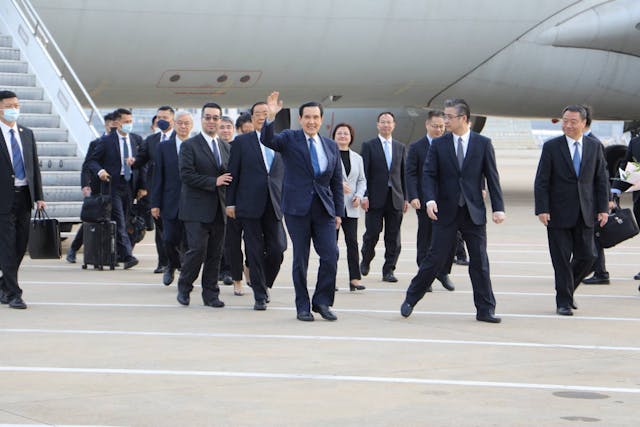
馬英九角色 或得到加強
馬英九此次大陸之行,對台灣內部政治和兩岸關係亦有直接的政治影響。
首先,馬英九深受大陸方面的尊重和信任,因此,他可以也必將成為京台關係中至關重要的中間人,尤其是在雙方或將探討一國兩制台灣方案的可行性和內容的緊要關頭。
馬英九在兩岸關係中的角色可能得到加強,包括可能不僅成為值得信賴的調解人,而且成為尋求大陸和台灣雙方都能接受的解決方案的中間人,甚至可能成為大陸和民進黨方面的中間人。
其次,無論誰代表國民黨參加2024年的總統選舉,都需要得到馬英九的支持。馬英九的背書很可能代表一個溫和的、謀求與大陸和平共處的國民黨總統競選綱領。 相反,2024年總統大選的民進黨候選人,很可能是現任副總統賴清德,他或許要承受很大壓力,要求他改善和緩和對北京的政策。
事實上,兩岸關係已經惡化。蔡英文近日訪美並在加州會見美國眾議院議長麥卡錫,已招致大陸當局和傳媒的批評。中國外交部於4月7日對哈德遜研究所、列根圖書館及其主管違反「一個中國」原則實行了制裁。北京還制裁了台灣駐華盛頓代表蕭美琴,禁止她和她的家人訪問大陸、香港和澳門。
第三,在國民黨正在尋找2024年總統大選最強候選人之際,馬英九的支持很可能成為國民黨尋找能夠擊敗民進黨一方的候選人的「造王者」。 鴻海集團創辦人郭台銘宣布將參加2024年總統大選,但他補充說,如果民意調查顯示他的支持率落後於任何國民黨競爭者,他本人將選擇退出並支持更受歡迎的候選人。
國民黨問題的癥結在於缺乏一位很具魅力的領袖。朱立倫是一位相對弱勢的黨主席。 只有新任台北市長侯友宜似乎是國民黨領導層中較有實力的候選人。 因此,無論馬英九在政治上的公信力和對大陸的信任度如何,提名國民黨最強候選人參加2024年總統大選,仍是一個有待解決的問題。
國民黨缺乏人選
總而言之,在兩岸執政黨根本互不交流的情況下,馬英九的大陸之行代表了兩岸關係的重大改善。蔡英文訪美是疏遠中方的舉動,而馬英九訪大陸則是兩岸商討解決政治分歧的機會之窗。 話雖如此,兩岸關係的障礙更多來自台灣方面; 雖然民進黨缺乏建設性的對大陸政策,更不用說接觸政策,但在當前尋求代表國民黨參加2024年總統大選的最強有力候選人的過程中,仍需要盡量減少該黨內部的分裂。但是,有一點是可以肯定的:馬英九將成為國民黨精英和台灣總統選舉中至關重要的「造王者」,是大陸與台灣之間的中間人,是為大陸出謀獻策「一國兩制台灣方案」的重要中間人。 在未來的歲月裏,對大多數台灣同胞來說確實是有吸引力和可以接受的。
Ma Ying-jeou’s Visit to the Mainland and Its Implications for Cross-Strait Relations
The 12-day visit of the former Kuomintang (KMT) President Ma Ying-jeou to mainland China has tremendous political implications for not only Taiwan’s domestic political development but also cross-strait relations in the coming years.
Ma’s visit was carefully planned and executed as he visited Nanjing, Wuhan, Hunan, Changsha, Chongqing, and Shanghai – each place with its political symbolism and special significance. In Nanjing, Ma toured the memorial remembering the death of all victims during the Nanking massacre and, most importantly, he visited the Sun Yat-sen Mausoleum in Nanjing. During Ma’s visit to the Sun Yat-sen Mausoleum, he used the term “Republic of China” to refer to Sun’s contributions to the Chinese revolution of 1911 – a term embedded in the message of the “1992 consensus” in which both the KMT and the Communist Party of China (CPC) agree that there is only one China, but that the meaning of one China is up to both sides’ interpretation (the People’s Republic of China from the CPC side).
Ma added that Sun Yat-sen opposed separatism and that the people on both the mainland and Taiwan should strive for peace and should have the duty of achieving the Chinese rejuvenation. The term “Chinese rejuvenation” used by Ma resonates the CPC’s usage of the term “Chinese renaissance” – another political symbolism meaning that the mainland and Taiwan actually share the common objectives of achieving peace and Chinese rejuvenation (or renaissance) in the coming decades.
From the perspective of political symbolism, the ability of Ma to use the term “Republic of China” was a powerful rebuttal to Taiwan’s ruling Democratic Progressive Party (DPP)’s argument that the two straits should not be subordinate to any party concerned. The crux of the problem was that the DPP refuses to accept the 1992 consensus, whose immediate significance is to agree on “one China” and whose underlying meaning is to put aside the difference over the official name of “one China.”
Zhu Fenglian, a spokesperson for the Taiwan Affairs Office of the State Council, had said on February 25, the 1992 consensus “embodies the one-China principle” and it clearly defines the nature of cross-strait relations and serves as the common political foundation for promoting the peaceful development of relations across the Taiwan Strait.
Interestingly, on the first day when Ma visited the mainland, Zhu Fenglian answered a reporter’s question by saying that, if Taiwan authorities accept the 1992 consensus, the Taiwan side would be able to focus their efforts at dealing with the people’s livelihood on the island. Her remarks could perhaps be interpreted that, if Taiwan accepts the 1992 consensus, the military deterrence strategy adopted by the Taiwan side would be unnecessary. If this interpretation is accurate, then Zhu’s remarks seemed to imply that the People’s Republic of China (PRC) would perhaps consider the renouncement of using military force to deal with Taiwan’s political future on the condition that the Taiwan authorities formally accept the 1992 consensus.
In fact, the emphasis on the Taiwan side’s recognition of the 1992 consensus was mentioned in Ma Ying-jeou’s meeting with Song Tao, the new head of the Taiwan Affairs Office and the former vice minister of the CPC’s International Liaison Department. Song said on March 30 that the people on the two straits are like a family and that they have to embrace the 1992 consensus to promote the peaceful development between mainland China and Taiwan.
Song chose Wuhan as a city where he met Ma Ying-jeou. Symbolically, Wuhan represented a city where the KMT left-wing leaders set up their base in 1926-27. The choice of Wuhan for Song Tao to meet Ma was coincidentally interesting, partly because the CPC is ideologically “left-wing” and partly because Wuhan in 1927 symbolized a divided China that necessitated the northern expedition launched by the right-wing leader Chiang Kai-shek and his supporters. Today, with the CPC as the ruling party in mainland China, its remaining task of reunification emphasizes the peaceful means through the usage of the 1992 consensus, which according to Zhu Fenglian can bring about more cultural, economic and people-to-people interactions between the two straits.
Song Tao accompanied Ma Ying-jeou to take a high-speed rail from Wuhan to Changsha, where Ma paid tribute to his ancestors at the ancestral graves with nearby road repair and renovation work.
Ma’s emotional reactions during his trip to ancestral graves symbolically showed that the mainland authorities attach great importance to the family ties and history of the people of Taiwan, many of whom have relatives and ancestors in the mainland.
What is interesting in Ma’s visit to the mainland is that he led some young Taiwan students to visit various sites and historical museums. All these visits could undoubtedly enhance the historical consciousness and knowledge of the Taiwan youth about the Second World War during which the KMT and its soldiers fought bravely and fiercely against the Japanese invaders.
At Hunan University, students from the mainland interacted with the university students from Taiwan. They discussed not only the Chinese resistance to the Japanese invasion during Second World War but also the Hunan culture and Confucianism. It can be expected that both sides would explore the possibility of enhancing student exchange and cultural studies in the future.
As Ma emphasized at the end of his trip that he is approaching 73 years old, the Taiwan youngsters who accompanied him to visit the mainland would play a crucial role in the tasks of enhancing mutual understanding between the mainlanders and the Taiwanese, and of achieving peace between the two Straits.
Ma’s popularity was apparently high in the mainland; he was greeted by many ordinary people in the mainland, especially in Changsha where he toured the night market.
Ma was given a VIP treatment and greeted by other high-ranking CPC officials, including Hunan provincial party-secretary Shen Xiaoming, governor Mao Weiming and Chongqing party-secretary Yuan Jiajun.
Ma’s visit to the mainland has been dismissed by the DPP critics as a move vulnerable to the mainland’s united front and political co-optation. However, the enhancement of mutual understanding and the recultivation of some degree of political trust between the mainland and Taiwan are the positive aspects neglected by Ma’s critics, especially after three years of mutual disconnect during the Covid pandemic.
Ma Ying-jeou’s visit to the mainland has immediate political significance for Taiwan’s domestic politics and cross-strait relations.
First, Ma Ying-jeou is highly respected and trusted by the mainland side, and as such, he can and will become a crucial middleman in Beijing-Taipei relations, especially during a critical juncture when both sides would perhaps explore the feasibility and content of the “Taiwan model” of “one country, two systems.”
The roles of Ma Ying-jeou in cross-strait relations will likely be strengthened, including the possibilities of becoming not just a trusted mediator, but also an intermediary finding a solution acceptable to both the mainland and Taiwan side, and perhaps a middleman between the mainland and the DPP side.
Second, whoever will represent the KMT to run in the 2024 presidential elections will need to secure the support of Ma Ying-jeou, whose endorsement would likely represent a moderate KMT’s presidential election platform that will cultivate harmonious relations with the mainland. Conversely, the DPP candidate in the 2024 presidential election, quite likely the current vice president William Lai, would very likely be under tremendous pressure to improve and moderate its policy toward Beijing.
In fact, cross-strait relations have already worsened. The recent visit by Tsai Ing-wen to the US and her meeting with US House Speaker Kevin McCarthy in California have already led to criticisms from the mainland media and authorities. The PRC Foreign Ministry sanctioned on April 7 the Hudson Institute, the Ronald Reagan Presidential Library and Museum and leaders for their “violation” of the one-China principle. China has also sanctioned Hsiao Bi-khim, Taiwan’s representative in Washington, prohibiting her and her family members from visiting the mainland, Hong Kong and Macau.
Third, at a time when the KMT is looking for its strongest candidate running for the 2024 presidential election, Ma’s support will likely be a kingmaker in the KMT’s quest for the candidate who would defeat the DPP side. Terry Guo, a former KMT business elite, announced that he would run in the 2024 presidential election, but he added that, if opinion polls show his popularity lags behind any KMT contender, he himself would opt out and give way to a more popular candidate.
The crux of the problem of the KMT is that it lacks a highly charismatic leader. Eric Chu remains a relatively weak chairman. Only the new Taipei mayor Hou You-yi appears to be a stronger candidate within the KMT leadership. As such, regardless of Ma’s political credibility and trust to the mainland side, nominating the strongest candidate from the KMT to compete in the 2024 presidential election remains a problem to be resolved.
In conclusion, Ma Ying-jeou’s visit to the mainland represents a significant improvement in cross-strait relations at a time when the ruling parties across the two straits do not speak to each other at all. Tsai Ing-wen’s visit to the US was a move that alienated the PRC side, but Ma Ying-jeou’s visit to the mainland represents a window of opportunity for the two straits to hammer out solutions to their political differences. Having said that, the obstacles to cross-strait relations stem more from the Taiwan side; while the DPP lacks a constructive, not to mention engagement, policy toward the mainland, the KMT’s internal fragmentation needs to be minimized in the current quest for the strongest candidate representing the party in the 2024 presidential election. However, one thing is certain: Ma Ying-jeou is going to be a crucial kingmaker within the KMT elite and presidential politics, an intermediary between the mainland and Taiwan, and a crucial middleman who can advise the mainland how to make the “Taiwan model” of “one country, two systems” really attractive and acceptable to most Taiwan comrades in the years to come.
原刊於澳門新聞通訊社(MNA)網站,本社獲作者授權轉載。原文網址:
https://www.macaubusiness.com/opinion-ma-ying-jeous-visit-to-the-mainland-and-its-implications-for-cross-strait-relations%EF%BB%BF/



